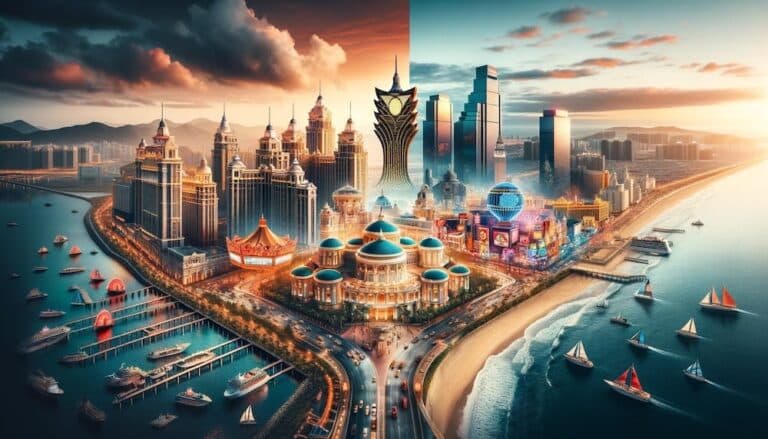In the world of gambling and luxury entertainment, two names often emerge as powerhouses: Macau and Atlantic City. While both destinations are revered for their vibrant casino scenes, they cater to distinctly different markets and cultures, reflecting unique trends in global gambling. This comparative analysis delves into the essence of what makes each location unique and how they stand in terms of appeal to international visitors.
The Backdrop
Macau: Often referred to as the “Las Vegas of Asia,” Macau has established itself as a gambling behemoth, surpassing the revenue of its American counterpart. Its proximity to mainland China and other Asian countries has positioned it as a lucrative spot for high rollers and casual gamblers alike. Macau’s casinos are known for their grandiose design, with many operated by international corporations that bring a global flair to the gaming experience.
Atlantic City: Situated on the East Coast of the United States, Atlantic City has a rich history dating back to the early 20th century. Known for its iconic Boardwalk, it has long been America’s playground, offering a mix of beachfront leisure and casino gambling. While it has faced economic challenges and increased competition from other states in recent years, Atlantic City remains a beloved destination for many American gamblers and tourists.
Gaming Culture and Population
Macau draws a significant portion of its visitors from mainland China and neighboring countries, including Hong Kong and Taiwan. The gambling culture here is heavily influenced by Chinese preferences, with games like Baccarat and Sic Bo taking center stage. The city’s casinos are not just gaming hubs but also cultural and luxury entertainment centers, attracting a diverse international audience.
Atlantic City, on the other hand, has a more American-centric visitor base, with a significant number of tourists coming from within the United States. The gaming culture is varied, with a strong emphasis on slots, poker, and traditional table games like Blackjack. Atlantic City casinos also offer a range of entertainment options, from live shows to dining experiences, catering to a wide demographic.
Economic Impact and Growth
Macau’s gaming industry is a critical component of its economy, contributing a substantial portion of its GDP. The city has seen explosive growth over the past two decades, with gaming revenues often cited as the highest in the world. This growth has been fueled by the liberalization of the casino industry and investment from international operators.
Atlantic City has experienced its share of economic ups and downs. The legalization of gambling in the late 1970s led to a boom, but the city has since encountered challenges from the expansion of casino gambling in neighboring states. Despite this, recent developments and renovations signal a positive outlook for Atlantic City’s future.
Future Outlook
Macau continues to evolve, with plans for further diversification into non-gaming tourism and entertainment offerings. The government and casino operators are looking to attract a broader international audience, expanding beyond gambling to ensure long-term sustainability.
Atlantic City is also adapting, focusing on revitalizing its casino sector and expanding its appeal as a resort destination. Efforts to enhance the city’s infrastructure and broaden its entertainment options aim to attract a new generation of visitors.
Conclusion
While Macau and Atlantic City cater to different markets and cultures, both remain iconic destinations in the global casino landscape. Their ongoing evolution reflects the dynamic nature of the gambling industry, with each city leveraging its unique strengths to attract visitors from around the world. As they continue to adapt to changing trends and economic conditions, Macau and Atlantic City will undoubtedly remain at the forefront of the world’s premier gambling destinations.

Garry Sputnim is a seasoned journalist and storyteller with over a decade of experience in the trenches of global news. With a keen eye for uncovering stories that resonate, Alex has reported from over 30 countries, bringing light to untold narratives and the human faces behind the headlines. Specializing in investigative journalism, Garry has a knack for technology and social justice issues, weaving compelling narratives that bridge tech and humanity. Outside the newsroom, Garry is an avid rock climber and podcast host, exploring stories of resilience and innovation.


